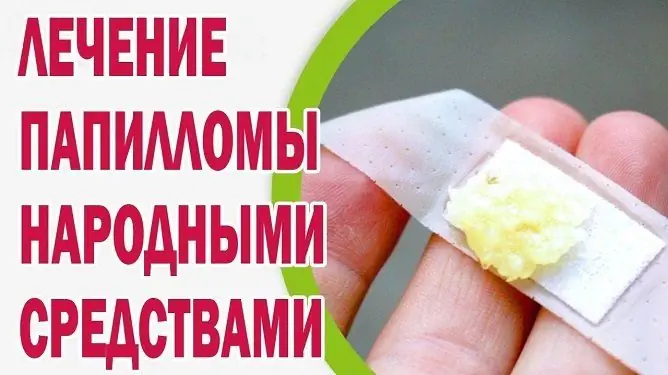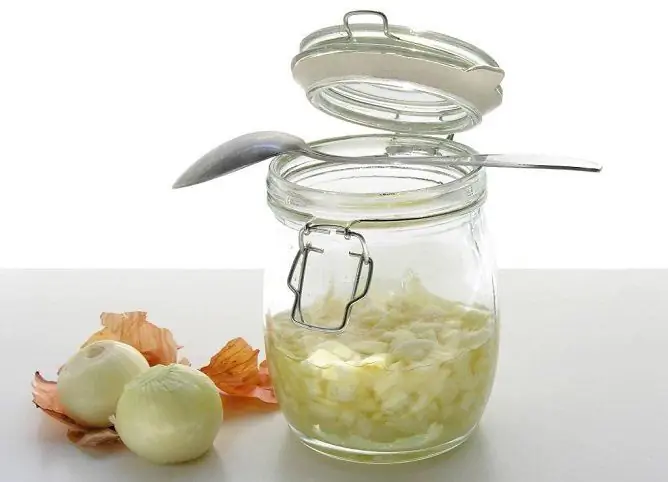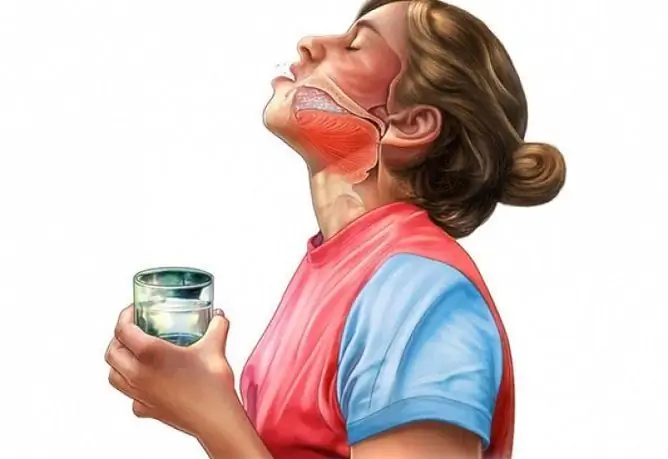- Author Rachel Wainwright wainwright@abchealthonline.com.
- Public 2023-12-15 07:39.
- Last modified 2025-11-02 20:14.
Cystitis
General characteristics of the disease

Cystitis is an inflammation of the bladder. As a rule, the mucous membrane of the walls of the organ is susceptible to inflammatory processes caused by various kinds of infections. At least once in a lifetime, the disease is diagnosed in every eighth woman.
In men, cystitis is much less common. This fact is explained by the peculiarities of the anatomical structure of the female urinary tract, namely the closer location of the external opening of the urethra to the anus.
However, it is in men that cystitis of a chronic form is one of the most important signs of prostate pathologies or tumors of the urinary tract. In women, on the contrary, cystitis is most often found as an independent disease caused by staphylococcus, fecal streptococcus, etc.
Sometimes the cause of cystitis in men and women is chronic pyelonephritis or renal tuberculosis.
The risk group with an increased likelihood of developing cystitis includes:
- pregnant women;
- elderly people;
- patients with diabetes mellitus, spinal cord injuries, multiple sclerosis and any type of blockage of the urinary tract (tumors, kidney stones, polyps in the bladder, etc.).
The likelihood of developing cystitis increases the use of the contraceptive diaphragm and anal sex. Any of the above factors can cause infection of the bladder and lead to complications: pyelonephritis, renal failure, sepsis, as well as prostatitis with cystitis in men.
Cystitis symptoms
Depending on the severity of the symptoms of cystitis, it is customary to distinguish two main forms of the disease.
Acute cystitis often provokes hypothermia. The early symptoms of cystitis of this form include painful frequent urination. The medical term for this phenomenon is stranguria or pollakiuria.
Symptoms of cystitis in the progressive stage of the disease are an increase in temperature to subfebrile levels, soreness of the abdomen on palpation, turbidity of urine. With lesions of the bladder neck, slight bloody discharge in the last portion of urine is possible.
Symptoms of acute cystitis appear up to 7-10 days. Then there is a significant improvement in the patient's well-being or the transition of cystitis to a chronic form.
In chronic cystitis, symptoms are less pronounced. The patient feels minimal discomfort in the lower abdomen, short-term increased urge to urinate. Chronic cystitis always occurs with periods of short-term exacerbation of the process and leads to a persistent increase in the level of leukocytes and erythrocytes in the urine.
Diagnosis of cystitis

Acute cystitis is diagnosed based on the patient's complaints of frequent and painful urination, as well as urine tests according to Nechiporenko. Ultrasound examination in this case is used to exclude organic pathologies of the bladder.
The diagnosis of chronic cystitis is more difficult to establish due to the low severity of symptoms. Chronic cystitis is established after studying the composition of the microflora of the bladder by culture. To exclude obstruction (blockage) of the urinary tract against the background of chronic cystitis, the diagnostic uroflowmetry method is used.
In the diagnosis of chronic cystitis in women, a vaginal smear is always taken to exclude or confirm the genius etiology of the infection. The degree and localization of inflammation of the bladder in chronic cystitis can be determined by cytoscopy. The use of the latter is contraindicated in acute cystitis, since it can cause a sharp deterioration in the patient's condition.
Cystitis treatment
In the treatment of acute cystitis, antibacterial therapy with IV generation drugs is used. It is customary to supplement it with anti-inflammatory drugs, as well as drugs to improve blood supply to the bladder and adrenergic blockers to relieve painful urinary tract spasms. Treatment of cystitis is carried out orally, by injection, vaginally or rectally.
Treatment of chronic cystitis requires a different approach. In this situation, the main efforts of doctors are aimed at eliminating not the infection itself, but the causes of the next inflammation of the bladder. In the treatment of chronic cystitis, surgical removal of stones or polyps in the urinary bladder, resection of the neck of the organ, hormone, vitamin, and physiotherapy are used.
Alternative treatment of cystitis
It is also possible to treat cystitis with folk remedies that have an antimicrobial, analgesic and immunity-enhancing effect.
Alternative treatment of cystitis with a diet is based on the exclusion of spicy foods, coffee, and alcoholic beverages from the patient's main diet. Recommended food:
- parsley;
- carrot;
- watermelons;
- lingonberry;
- cranberry;
- celery.
At the same time, it is extremely important that a patient with cystitis drinks at least 3 liters of fluid per day.

In the folk treatment of cystitis, many medicinal herbs are also used. Herbal preparations for the treatment of cystitis include bearberry leaves and stems, dill seeds, lingonberry leaves, parsley root, celandine, as well as many immunomodulating plants. The course of treatment of cystitis with folk remedies using herbal preparations should last at least 20 days.
In the treatment of cystitis caused by liver pathologies, decoctions of oats with the addition of calendula are used. A handful of flowers are poured into a broth cooked over a fire for 30 minutes. The medicine should stand all night, and after 8-10 hours it should be drunk in small frequent portions up to 1.5 liters per day. In the folk treatment of cystitis, flaxseed infusions, strong linden tea, decoctions of rosehip roots and poplar buds are also used.
However, it is important to remember that frequent bouts of pain and urge to urinate are symptoms of chronic cystitis, and in order to prevent another exacerbation of the disease, it is very important not to engage in independent alternative treatment of cystitis, but to find out the source of the infection.
YouTube video related to the article:
The information is generalized and provided for informational purposes only. At the first sign of illness, see your doctor. Self-medication is hazardous to health!






